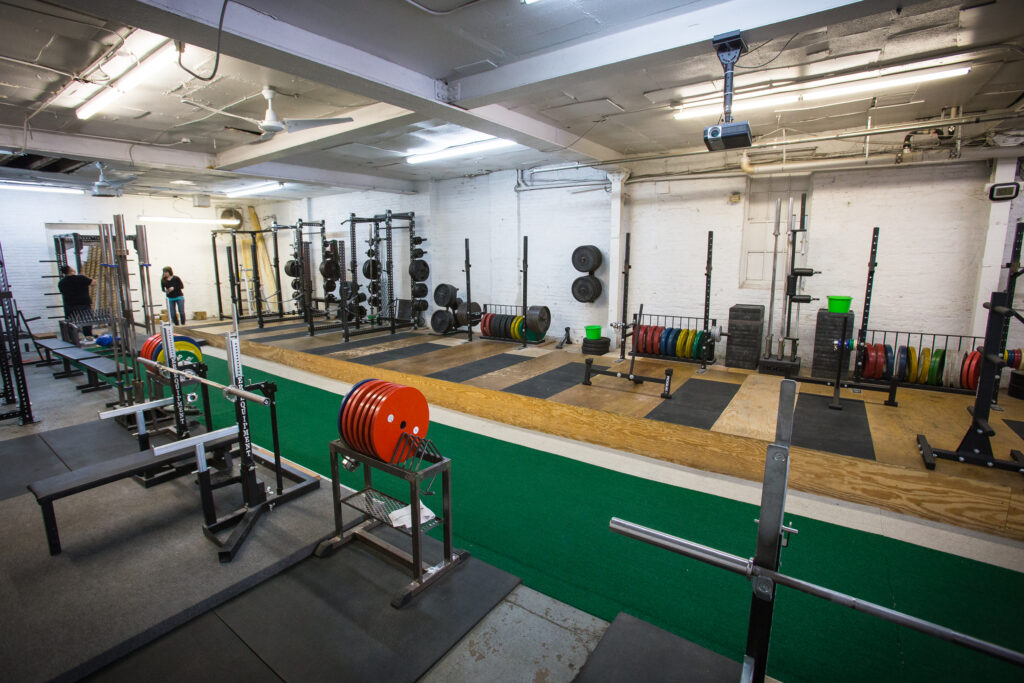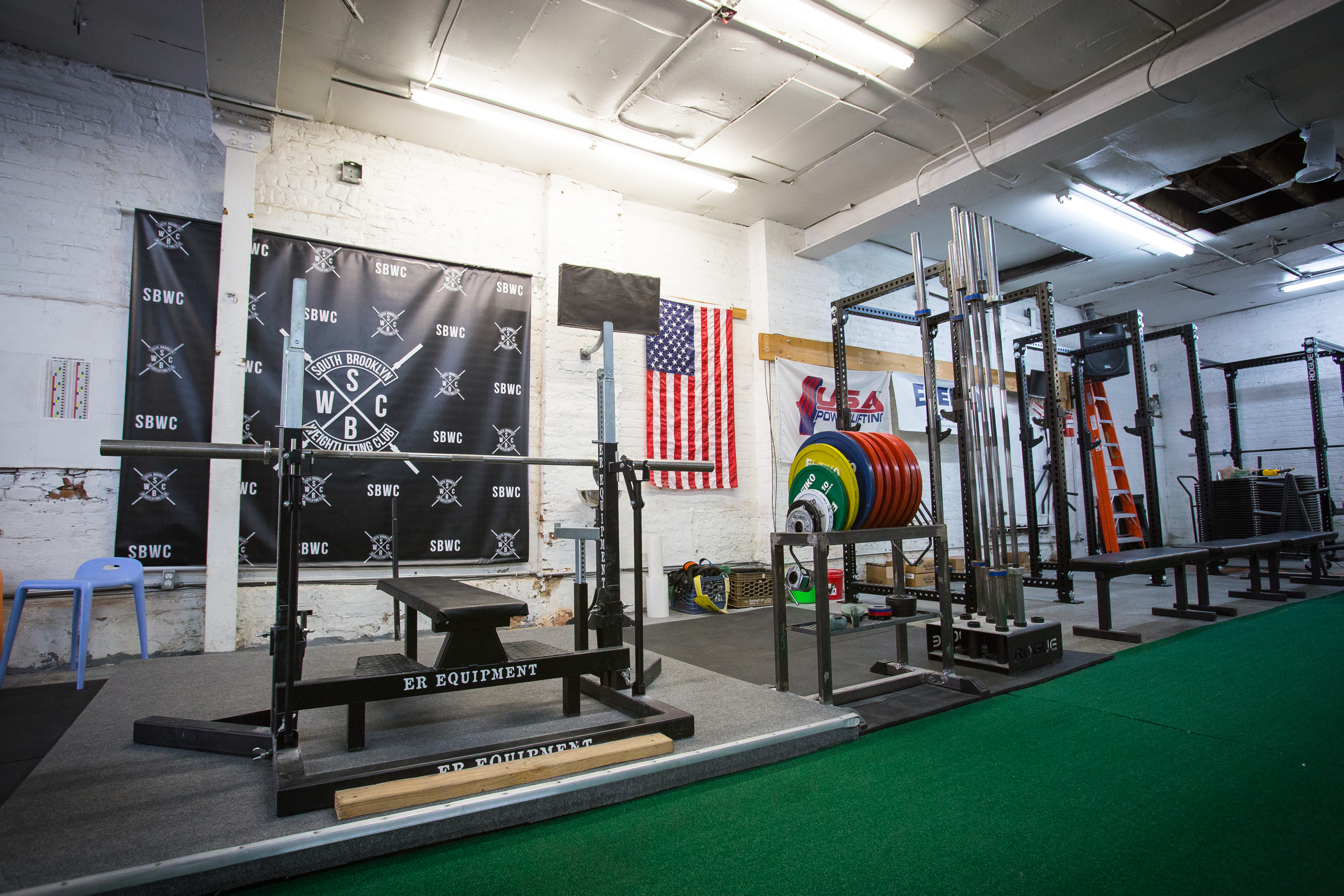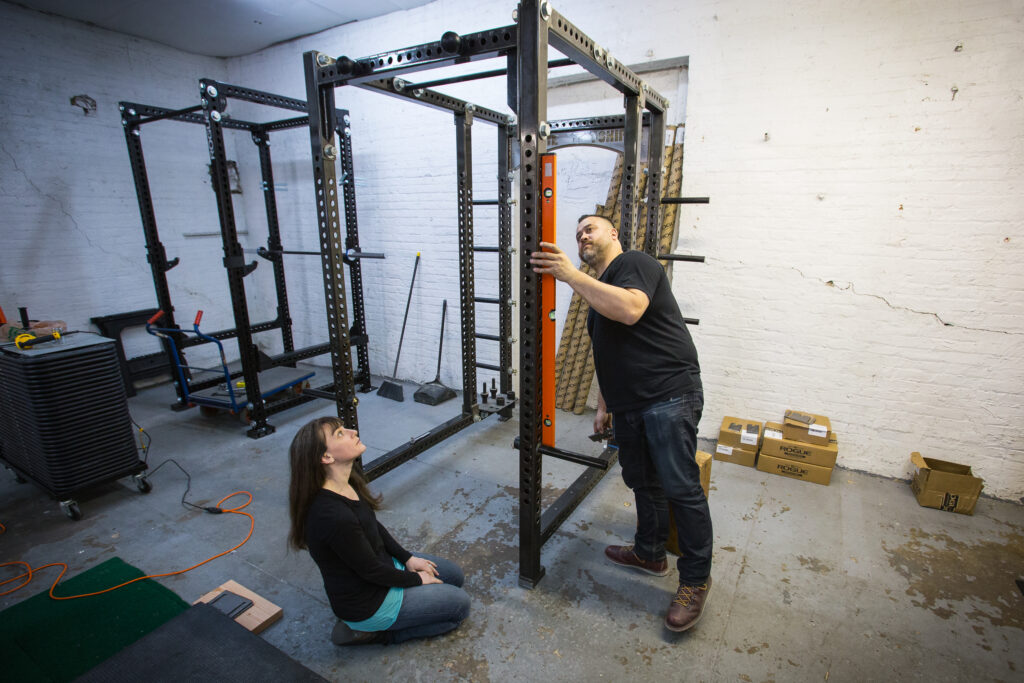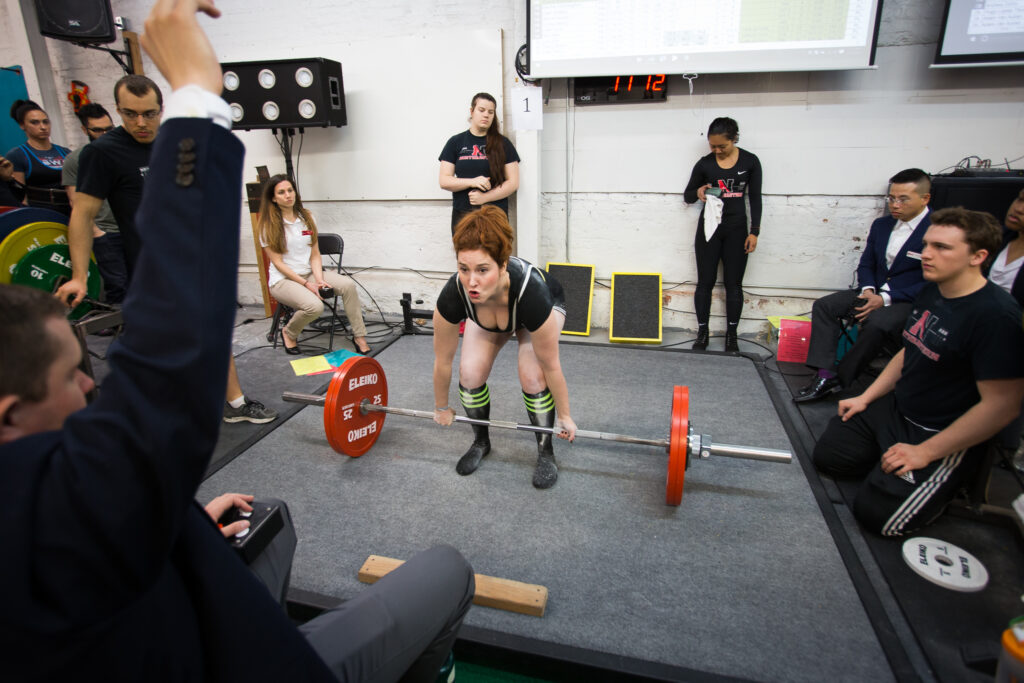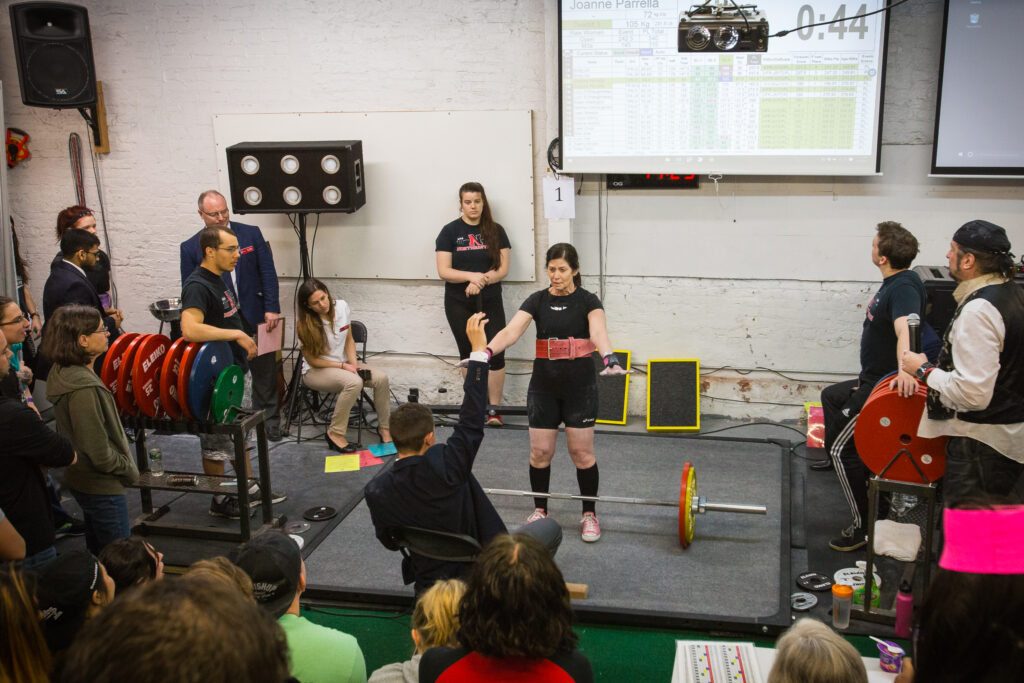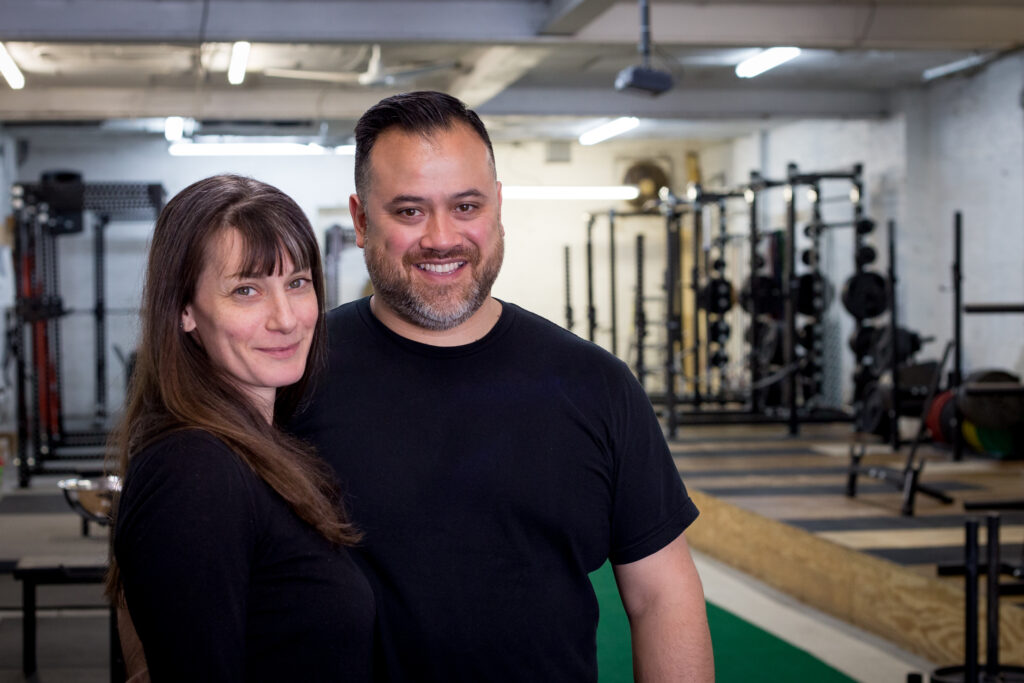Tucked away in a narrow warehouse on the edge of Gowanus in Brooklyn exists a gym unlike most others in New York City. No marble locker rooms. No showers. No treadmills.
The “cafe” is nothing more than a bin full of sour gummy worms and a college-size fridge stocked with Kill Cliff. There’s no water fountain, but there is a stack of plastic cups available…as long as you wash and dry them after use.
The only bright colors come from multiple sets of buffed Eleiko plates and an aisle of bright green turf that runs down the center of the room, both of which stand out amongst the black training plates and free weights.
This is South Brooklyn Weightlifting Club, New York City’s only dedicated Olympic weightlifting and powerlifting gym. Founded and operated by lifting power couple Paulie and Becca Steinman, SBWC is the kind of gym your grandparents may have been a part of. It’s simplicity stands out in a world of sweaty CrossFit boxes and shiny mega chains, but for those looking to focus on lifting, it’s basically barbell Disneyland.
I sat down with Paulie and Becca to chat about running a “dinosaur” gym in New York, what makes a great weightlifter, and why you should give powerlifting a shot.
—
Brooke: Before you guys ran SBWC, you owned a screen printing facility and dabbled in CrossFit. How did you make the transition from t-shirts to squats?
Paulie Steinman: We had some extra space in our screen printing facility down in Red Hook, so I got a rack and got certified with Starting Strength and whatnot.
It’s a typical story these days. A bunch of friends started coming over and training, then I started training people more formally — to the point where we kept expanding our footprint. About four and a half years ago, we decided to make this full time and come up [to this neighborhood] and be more accessible than in Red Hook.
Brooke: Were there any reservations about making this your full time career?
Paulie: I don’t know about reservations, but there was definitely fear. We were clear that we were going to do it, but we didn’t know how we were going to sustain for more than a couple of months if we didn’t grow. It was do or die.
Brooke: How did you find clients?
Becca Steinman: It was a lot of word of mouth, We’d already been training a couple other people so it there was a good, dedicated group. Honestly, people were starting to seek out lifting, powerlifting, or weightlifting, so they kind of found us. We didn’t advertise, per se.
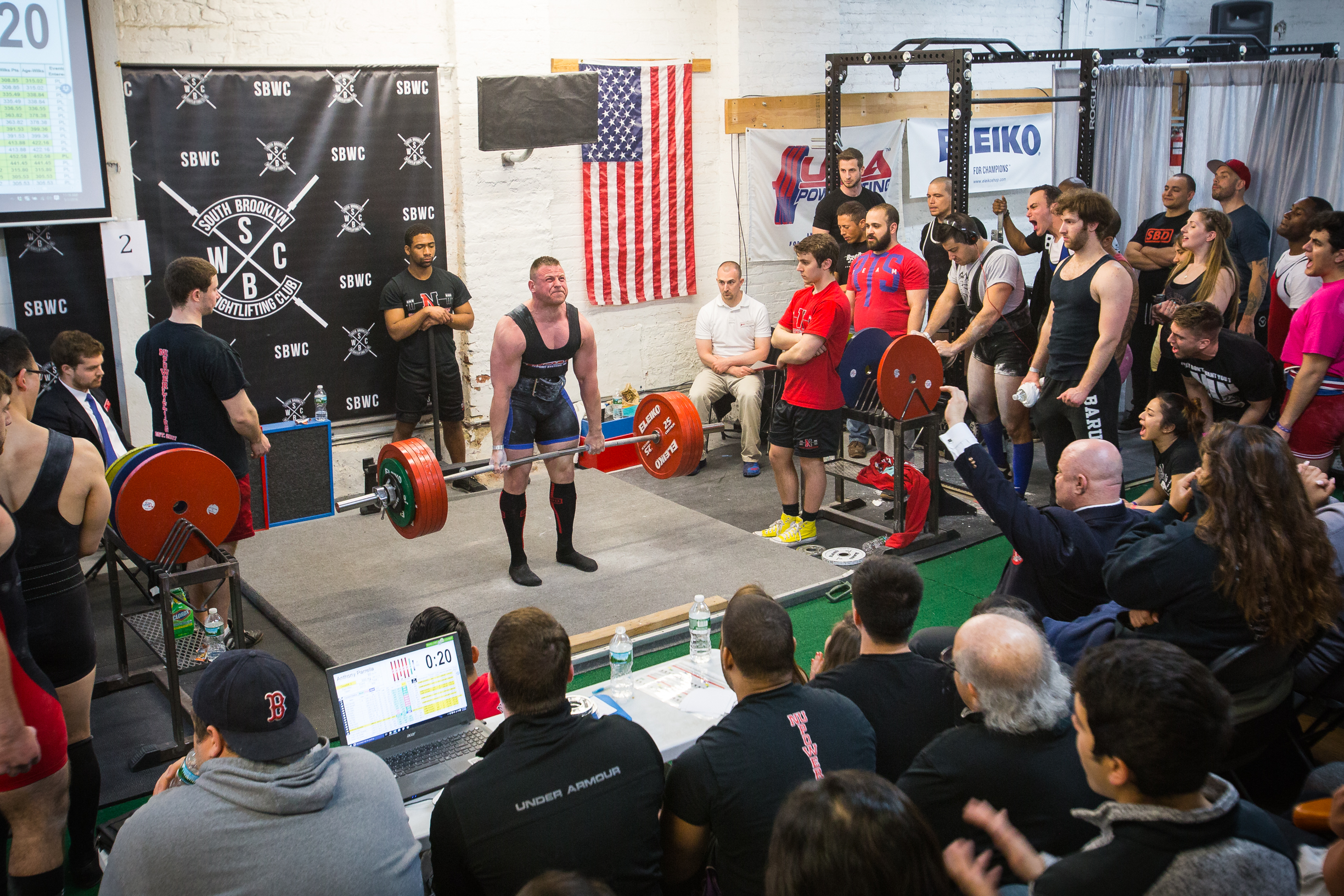
In the time we’ve been open, a lot of CrossFit gyms have dedicated weightlifting programs. A few of them have strength or powerlifting programing, but that’s where we excel and differentiate these days — with powerlifting. I don’t think CrossFit touches upon powerlifting nearly as much as they do with weightlifting.
Brooke: When they do, it’s part of the CrossFit programing. You bench once every six months, and there’s no technique involved beyond the technique that the coach knows from their basic course.
Paulie: It’s funny because one of the things that we hear is that people say is, “I love the challenge of weightlifting.” I’ll tell them, powerlifting is just as technical. Give it a shot. Usually after a couple of weeks, people are very surprised by how technical powerlifting is to execute properly. You skill to move a lot of weight safely, whether it’s in powerlifting or weightlifting.
Brooke: It’s like a golf swing. It looks so simple.
Paulie: Right.
Becca: In CrossFit [perfect technique] doesn’t matter at a certain point. It’s either for time or good enough within the realm that you’re doing it in. People come here, whether for weightlifting or powerlifting, and they think we’re so picky. Our job is to make your technique amazing.
Paulie: I tend to talk people out of weightlifting because of how much skill is involved in it. If I don’t see someone with a ton of potential from the get go — if they don’t have the right attitude — I’m honestly not interested in coaching them. It’s not me being arrogant, but I don’t want to fight somebody. I find that if somebody comes in with an attitude, it’s going to be a battle all the way through. I’d rather put my energy into people who want to be coached, people who want to learn.
Brooke: What do you look for in someone who says they want to try weightlifting?
Becca: The attitude is the main thing. Flexibility, too. Some people think if they have some athletic ability in other things they can weightlift well. That confidence is sometimes a killer, because they really, truly believe it. Also, just being able to get out of their own heads. They have to allow themselves to be coached. Some people think they’re coachable, but they’re just too caught up, and they can’t let go.
Brooke: Do you notice a pattern in the type of people with specific backgrounds who tend to have the athletic potential and the ability to be coached?
Paulie: Things like ballet. Gymnastics is the obvious one. Someone coming from track and field sometimes has the explosive strength. One of the things I find though, is that unless someone wants to be stuck clean and jerking and snatching really low weights, they’re going to have to get strong. I feel like people who come into weightlifting are not interested in doing what it takes to get strong and get skilled. It’s two different things. You have to get skilled in your strength to move efficiently and safely, and it’s a lot of work. I go back to saying it again: people don’t want to put the work in.
Becca: Along those lines, I feel like it’s just impatient people. No one has the patience.
Brooke: Especially adults who pay to be here, unlike kids who are forced into it.
Paulie: It’s like an old Russian ballet teacher yelling at you when you’re four. It didn’t matter what you wanted, you did what they said. Now if I yell at people, I have a business here. They’re going to get upset and leave…
Brooke: …and bitch about you on yelp!
Paulie: Yes! But they come in here and want to get good. There are people who leave this gym, and there are plenty of people who have left, but they want to go somewhere that’s easier and less stressful.
A lot of people put that stress on themselves, especially over achieving adults in New York. It has nothing to do with us, and it’s a volatile combo. You tell them they’re not great at this sport, or they think they can just do a little bit and get good at it, and it doesn’t bode well. If someone would just let me do exactly what I wanted to do do with them, they’d probably get really good, but that’s not our reality.
Brooke: Have you ever thought about moving to a place where you could grow a crop of lifters who will do exactly what you want?
Paulie: I think about it a lot…wouldn’t it be great if I didn’t have to deal with parking on the street? Or neighbors being on top of me? I could spread out. I could have space. I could build a gym where I’m not constantly having to shuffle things by a ¼ of an inch just to maximize space…I think it would be great. But, New York has been my home for 25 years, and I don’t know where else I’d go. I don’t know how I could put down roots somewhere else right now.
Brooke: New York needs this…
Becca: People are shocked that there’s not more gyms like this in NYC.
Brooke: Is SBWC still the only dedicated weightlifting and powerlifting gym in the city?
Paulie: For weightlifting and powerlifting, yes. A lot of CrossFit gyms now have some sort of sub program offered to their members, but to do powerlifting properly, in my opinion, you just have to do powerlifting. That’s kind of antithetical to CrossFit where you have to punish the specialist.
That said, we’ve seen a huge uptick in raw powerlifting because of CrossFit. It’s easy for CrossFitters to say, “that’s interesting, I want to try that,” and they can get right into it with the equipment they already have. There’s a very big learning curve with equipped gear, because you have to learn how to use your suit and learn to select the right weight and the right gear so they all match up.
Brooke: Is there stigma against equipped versus raw powerlifters?
Paulie: I think it’s an uneducated stigma, because people who don’t understand it say that it’s cheating. It’s the same thing as a sumo deadlift versus a conventional deadlift. People say a lot of things.
Becca: A lot of the top lifters compete in both.
Paulie: When I first started powerlifting, I started in raw, and I probably had more of a negative disposition toward equipped. I didn’t think it was necessary, etc. etc., but as i got into this sport, I realized there’s a place for everything. I’m not against anything! If someone wants to try something out, let’s try it out! If someone likes it, let’s keep going. If someone doesn’t like it, and doesn’t have the stomach for it, try something else.
Doing equipped lifting is painful. It’s literally painful. You see people pass out at high level meets just from how tight and constricting the gear is, but it needs to be that tight to be effective. There are a lot of things that are painful, but there’s something that keeps people doing it for a very long time.
Brooke: Why do it?
Paulie: Because it makes you feel alive. You know what that feeling is, and the only way you can get that feeling is by pushing yourself, and that’s why you do it. Think about it another way…think about if you didn’t do it, if you didn’t do something to push yourself.
It’s great when our lifters hit PRs. Sometimes the thing that’s hard to get across to a novice is to be patient. Being patient…sometimes they won’t get that payoff for months. Once it culminates in a meet, or in the gym, and they hit some massive PRs, and they have everyone in the gym has stopped what they’re doing to watch them and support them, they’re hooked. Once you get that feeling, it’s hard to get it out of your system.
Becca: And there’s no limit! You can always go faster, with more weight, and more reps. Genetic potential is the only limit.
Brooke: It’s one of the things that keeps adults interested…quantifiable results at any level.
Paulie: That’s what keeps people doing it. Some people do it because they’re afraid of knowing what will happen if they stop doing it. There’s also a subset of people who do it because it’s covering up for another addiction. That’s the truth of it, but whatever it is, I don’t care. I want people to lift! It doesn’t matter why.
I got a call from someone today from someone in her mid 50s, and she’s intimidated because everyone is so serious. I told her, that can be you too. I don’t know what the difference is [between you and them.]
Becca: Some people literally think they’re not strong enough or big enough to be here. I tell them it’s literally for anybody. Anyone who is healthy can do this.
Brooke: What do you think of armchair coaches and people who try to copy technique from lifters they see on Instagram?
Paulie: I don’t think it’s a good idea for a novice lifter to learn from the technique of a high level lifter, because the high level lifter has personalized that technique to their own body. It’s so custom tailored at the point, that there’s no way to exactly emulate it unless you were exactly them. Part of it is physical, part of it is mental.
We go to a high level meet and watch lifters, and it’s all different. Everybody has these tics, but then it trickles down and people will try to emulate someone even though they have no idea what they’re doing!
In powerlifting, we talk about Mike Tuchsherer. He does these things called pressure breaths when he deadlifts. It’s to the point where we joke about it because he doesn’t even know why he does it. He just knows it works, and he knows it helps. Then we see people try to emulate that setup to zero avail. We try to start teaching lifters as neutral as possible, and we slowly tailor the lifting to their abilities.
Brooke: What’s one piece of advice you’d give to large group of lifters?
Paulie: That’s easy. Be patient. Be patient in life, and in the moment. It’s the difference between a quarter second, and that’s the difference between a good lift and a bad lift. Knowing when to take your lift, or pack up and go home…New Yorkers aren’t patient but with patience, everyone can prevail. I believe that.
